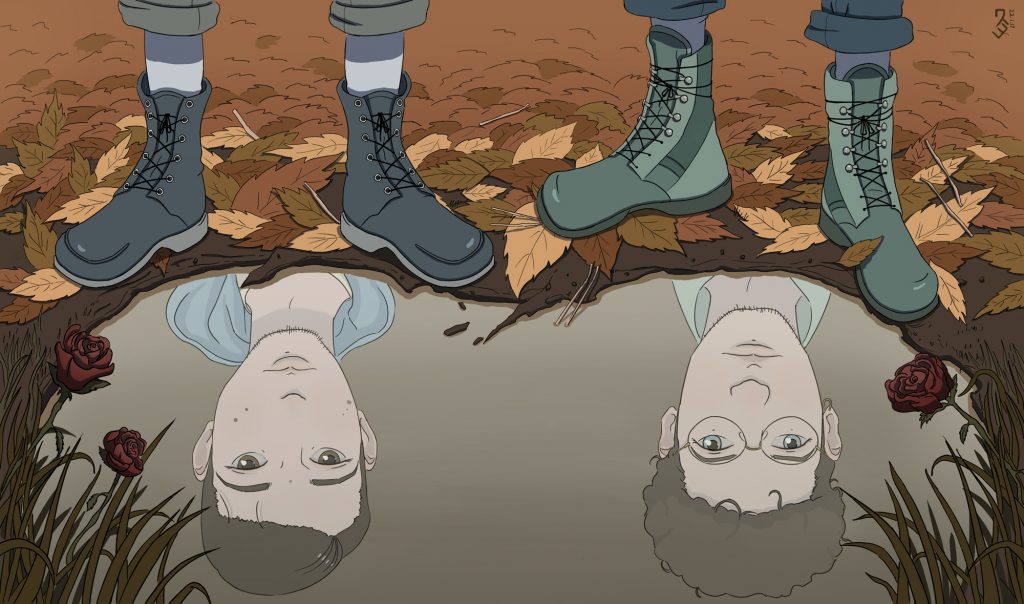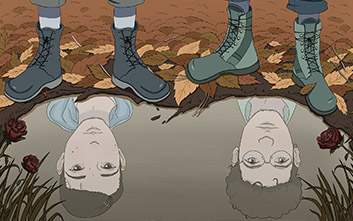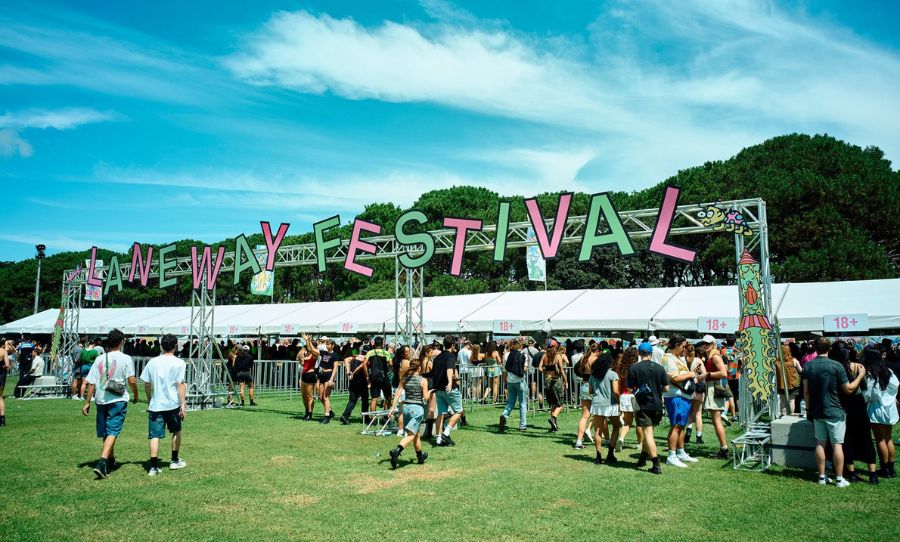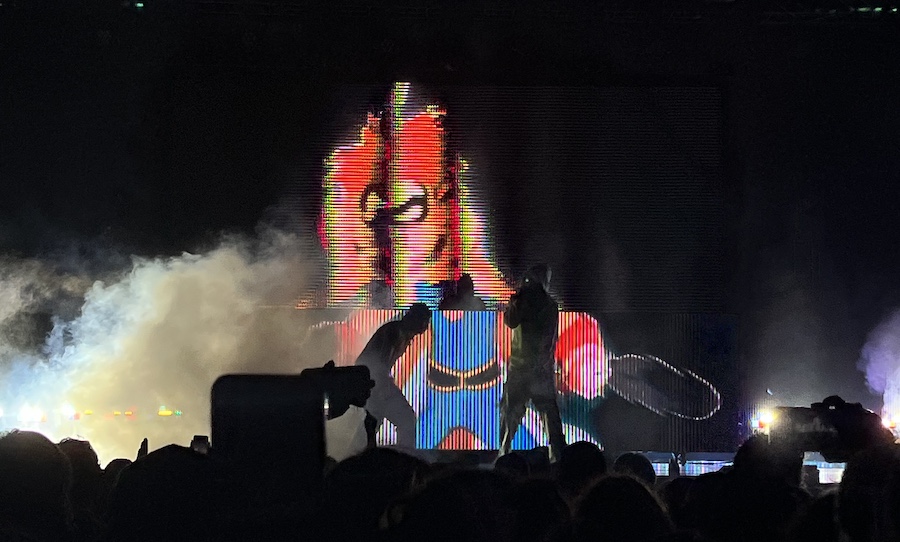Whitney is the product of a band’s breakdown and two mates rising from the heap to reinvent themselves. In 2016, following the dissolution of their first previous band Smith Westerns, Max Kakacek and Julien Ehrlich holed up in their Chicago apartment and started writing music together.
It was a transitional period for the duo, one of emotional and creative permutation that birthed Light Upon The Lake, one of the finest debut records we’ve heard in a long time.
We caught up with Max just before the band hit the Laneway circuit and a bunch of side shows to chat accidental synergy, the importance of honesty in writing music and the nuts and bolts behind one of the best records of 2016.

Dripping with inescapable heartache driven by sanguine melodies and luminous guitars, Whitney’s Light Upon The Lake won over many hearts in Australia in 2016 and is still doing so.
HAPPY: Hey Max. How’s it going. Have you made it over to Australia yet?
MAX: No, no, we’re still in Chicago. We’re heading to Asia first. Heading to South Korea, then onto Japan and Singapore.
HAPPY: Have you guys ever played in Asia before?
MAX: I’ve actually played there in a different band, but I think I was there for about a total of two days. We flew into Japan then played and flew out straight away.
HAPPY: I’ve heard the crowd in Japan are quite different to anywhere else in the world.
MAX: Yeah, they are. They’re super polite which is really different. I like it when it gets really quiet, it allows for a little more subtlety when you’re playing. You know, when a crowd is freaking out the whole time…
HAPPY: I feel like the quiet might suit a Whitney set a little better.
MAX: Oh yeah.
HAPPY: Have you guys ever been over to Australia before?
MAX: Julian has but not me.
HAPPY: Have you got any time off or are you flat out the whole time?
MAX: Yeah we’re pretty flat out the whole time. But you know, it’s hard to plan ‘cos we never really know the logistics until we get there, we just have to figure it out bit by bit.
HAPPY: I’ve heard that everyone usually has a bit of time off after the Sydney Laneway so everyone tends to have a bit of a post-festival party…
MAX: I’d be happy to do that…
HAPPY: So you and Julian played in Smith Westerns together. Can you tell me a little bit about what happened between the dissolution of that band and the start of Whitney?
MAX: Well I’d been in Smith Westerns for a long time, like seven years, since high school or whatever, and eventually the band ran it’s course as we all decided to kind of go our separate ways. And in the meantime, during that breakup period of six months or so – which I guess is a long time to decide to breakup, it wasn’t like one day it was over – in that time me and Julian became real good friends and he moved into my apartment that I had, and six to seven months later we started writing songs together. It wasn’t like we were jamming and writing songs together, it was more like a moment where we working on different projects and just hanging out all the time, then one day we wrote what went on to be Dave’s Song and were like, we should be in a band together. Two years later, here we are.
HAPPY: When you and Julian were in Smith Westerns, had you had any experience writing together or was Whitney a completely fresh experience for you both?
MAX: Yeah it was completely fresh. I mean, the songwriting in Smith Westerns was all Cameron and Cullen Omori, so for us it was completely new to work together.
HAPPY: I feel that you guys really wear your hearts on your sleeves on this record. How important that kind of honesty in the way you write music?
MAX: It’s heaps important. I think that’s pretty much everything about the band. I mean, we recorded the album the way we wrote it and everything about it is dictated by this idea of honesty and humanity.
HAPPY: Absolutely. In many ways the songwriting on Light Upon The Lake could have almost led it to being an acoustic folk record. What drew you guys to electric guitars and drums and electric pianos and trumpets? What shaped that sound?
MAX: For me personally, going from Smith Westerns to Whitney was a complete change from using synths and drum samples and stuff to writing stuff on organic instruments. And the way I think about synths is about what texture is it complimenting… the ideas the we had that I would normally play on synth or something in the past, we kind of moved into string or trumpet ideas. We pushed ourselves to learn as we went and about what might work with those instruments. It was a learning experience, which was really fun. But yeah, me and Jules recently played an acoustic show, just us two and two guitars and I was surprised at how well the songs stood up in such a stripped down setting.
HAPPY: Yeah, one of the first things that struck me about the record is that it could be completely stripped back, but then it’s got all these embellishments which add to its character. Have you guys played many acoustic shows together?
MAX: No, no that was the first one, the first true one where it was a proper session and we played for like 45 minutes. It went down really well. We were pretty nervous about it – in between apprehensive and nervous – but now that we know we can do it we’re a bit more open to the idea. I think our recordings will always remain… we’ll always push ourselves to keep things orchestrated rather than it being just guitar and vocals, but in the future I think we might do a few more live shows that are a little more stripped down. It’s kind of special in its own way, in front of lots of people.
HAPPY: How did you and Jonathan Rado (from Foxygen) end up working together?
MAX: I think someone played him a demo and he ended up asking if we wanted to come to L.A. to make a record. At that point nobody else had shown much interest so we were like “hell yeah”, and even if they had, I mean we were excited to get down there. He was great, man. He always worked super fast. He’s one of those people that you can just play a song to and he can just sit down and play it on piano and come up with something brilliant. Super talented dude. And very easy to get along with.
HAPPY: How formed were the songs when you went into the studio?
MAX: They were pretty much fully arranged by the time we got in there, I think the only song we spent much time on was No Matter Where We Go. The demo of that, I don’t know if you’ve heard it, it’s so different from the final version. It’s the one that got the biggest facelift. Most of the other songs had trumpets and strings on them and stuff already but were a bit more lo-fi and jangly.
HAPPY: So the strings and trumpets all arranged by you and Jules beforehand?
MAX: Yeah. And for songs like No Woman and Light Upon The Lake, we actually recorded the whole thing ourselves in our apartment in Chicago… the demos were the perfect versions of those songs.
HAPPY: You guys having written and recorded so much in Chicago, did that seep into the record at all or into the identity of Whitney?
MAX: Yeah absolutely. I think with songs on the album like No Woman and Light Upon The Lake that we recorded while we were writing them in our apartment in Chicago… I mean, in that time period the city had this great creative upturn. In the past two years it seems like a lot of bands have been coming out of there, and there’s something to be taken from that.
HAPPY: You guys have spent at least the last 12 months touring non-stop. What have been some of your favourite places to play?
MAX: The festival season in America is always really great, all the festivals are amazing. I dunno, I think it’s always hard when people ask what your favourite place has been, because, you know, it’s not doing justice to all the people are generous enough to come down and see us. I think whenever we get to be anywhere we’re pretty psyched – there hasn’t been a place that we’ve been like “get us out of here” yet.
HAPPY: And you’ve got another six months of touring ahead of you. Are you feeling exhausted at all or is there still a bit of stamina left?
MAX: I mean, we all get along so well, it’s just not that stressful. And we’ve kind of done it long enough now and know how not to treat our bodies and what we need to have to keep sane… I think we’re doing alright for now.
HAPPY: Have you guys had much of a chance to write on the road?
MAX: I really don’t like writing on the road. I feel like I’m way too schizophrenic and not settled enough to come up with anything. But there have been a few points over the past year where me and Jules have written some songs. We’ve mostly finished lyrics – the last part – of one song, so that’s pretty much completely done. And I can imagine we’ll be sound checking it in Australia to get ready to play it live.
HAPPY: So can we expect an album sometime next year?
MAX: Hopefully we’ll have everything written by [American] summer, because we have something like two months off after Australia then we’re back on the road until summer, and then a bit more time off after that so hopefully we’ll finish writing around then and recorded before the New Year. That’s hopefully the plan.
You can watch Whitney at the Laneway Festivals and a couple of side shows too. Head to the band’s tour page for more info.



